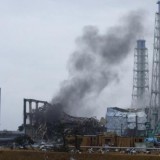The Common Sense Canadian is not a supporter of any political party but deals in issues and essentially we concentrate on the linked issues of the environment and energy matters.
The rationale for the Common Sense Canadian’s policy is this: every political party has the “cure” for all our social needs and each of them declares that it and only it has the ability to make the right moves to bring the actual result for what is demanded. But we have reached a crossroads – a true moment of truth.
There is surely one lesson we have learned: no matter how bad the opposition says the government is, the fiscal damage is reparable. Moreover, we ought also to have learned that each incoming government says that the situation was worse than they thought yet somehow they don’t turn out to be much of an improvement.
There is a huge difference in the messages. The Provincial Liberals, following the Socred line, tell us that the NDP left the treasury empty and ruined the economy. They make no allowances for what was known as the “Asian Flu” that so damaged BC’s export business. The fact that the NDP balanced their last year’s budget and that Premier Campbell thus saw fit to give better off people an instant billion dollar-plus tax break seems lost in the rhetoric that is politics.
I think that the case can be made that the Campbell government missed the clear signs of a recession which were there to be seen and simply didn’t tell the truth about that, and, of course, the HST.
The 1991-2001 NDP left a lot to be desired, especially in the leadership department – with four premiers in that period – and were so incapable of keeping the ship steady they were forced to bring outsiders into cabinet.
It’s not my purpose to defend or vilify either party but simply to make the point that no government has a monopoly on stupidity and no government has really wrestled the problems of health care, education, welfare and unemployment to the ground and none are likely to.
In the many years I’ve been involved in political life this is the first time I’ve seen a situation which, if not changed, will permanently leave longstanding wounds – wounds which will get worse and be incurable to boot. One of these is of a visual nature which goes to the very root of what British Columbia really is; that goes to the very root of how we keep being prosperous or at least give stability to our province in economic terms. These issues are intertwined.
The first is the environment. Virtually all mankind has played havoc with the environment but that’s surely no excuse for us to falter. We don’t have to destroy our forests to make a living. We have no need to jeopardize, indeed kill off our wild salmon so that people other than British Columbians can provide dividends for their shareholders.
We have no need to sacrifice our rivers so, once again, outsiders can profit from the electricity produced.
The second is BC Hydro, the main gem in the provincial crown. WAC Bennett saw three areas where the people, through those they elect, could use crown corporations for good policy decisions.
Bennett knew that no private ferry system would keep unprofitable routes yet he also knew that all British Columbians must have decent, affordable transportation options, so he bought Black Ball Ferries and created BC Ferries – which Gordon Campbell privatized. It left us the worst of all results – BC no longer directs its affairs but must still subsidize it.
Bennett knew that BC, large and bountiful as it is, needed a rail system that would lose money on some runs in order to open the province up and thus should be owned by the people and again a vehicle for public policy. Campbell gave this away to the private sector which won’t tolerate losing lines.
Bennett also knew that for British Columbians to compete and prosper it must have certainty of power both at home and in industry, so he bought out BC Electric Railway and created BC Hydro. This company was a huge success yet Campbell has developed a private power scheme leaving BC Hydro in a position that, if it couldn’t go on raising rates to subsidize its mandated giveaway program, would be bankrupt. It will be sold by way of bankruptcy, a bankruptcy which is clear on the horizon.
We must surely re-evaluate our political priorities. If the sale or disposition of our public assets would bring us prosperity thus making us better able to meet social obligations that would be one thing. But the fact is that each of these privatizing schemes hurts our economy badly.
For the first time in our history we have embarked on a program to destroy our environment and our ability to make our own rules about transport and power – and we have done this for the immense enrichment of others.
For the first time we have policies in place that will deliberately destroy the environment for private energy we can’t use, the profits from which go to large out of province corporations.
I believe that the last chance we’ll have to save the situation is in the forthcoming federal election and the provincial election most likely to occur this Fall, if not sooner.
This means, in my view, we must make a stark decision: are we, in exchange for the usual promises about health care, education, and welfare, going to put back into government those who are destroying our environment and giving away our power?
To this must be added that both the Federal Conservatives and the provincial Liberals have lied through their teeth in doing their destructive deeds.
The federal Conservatives are as much to blame as the Campbell/Clark bunch. One need only look at what’s coming out of the Cohen Commission to see how the destruction of our salmon by fish farms is not an accident but a very careful and deliberate policy. Moreover the feds have actually been financing the Independent Power Producers with our tax money! Can you beat this? Your tax dollars are going to help General Electric destroy our rivers and our power system!
In one line I want to dispose of the notion that we need majority governments: can you imagine what the Harper government would have done if they had a majority?
At The Common Sense Canadian we will support candidates who will end the giveaways and recover that which can be recovered, knowing that painful though the decision may be to many of us, our environment and energy will continue to be stolen from us, with one of the clear consequences that we have even less money to look after our hospitals, schools, universities and those who need help.




